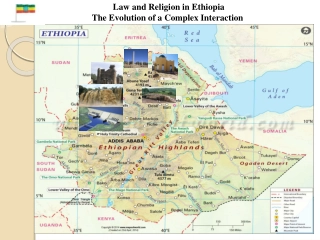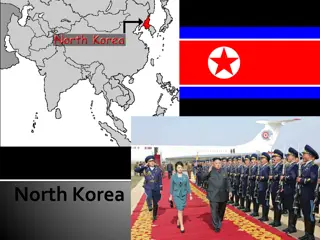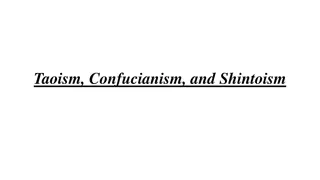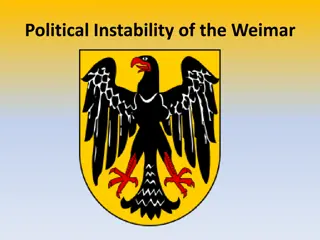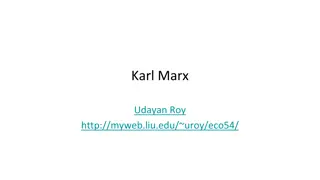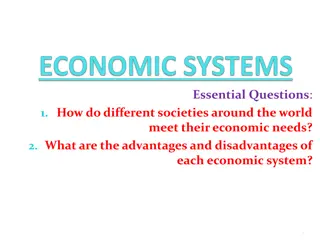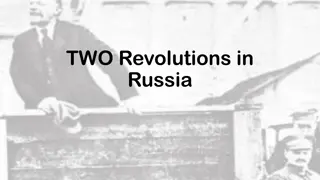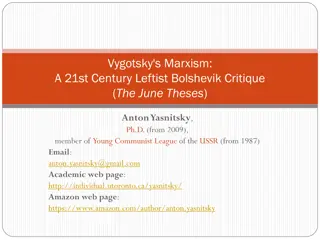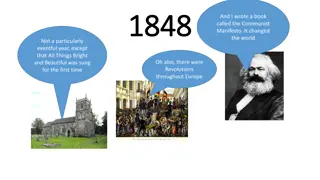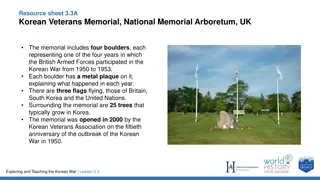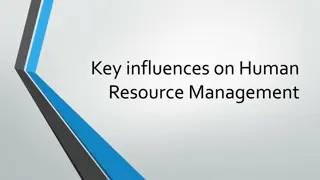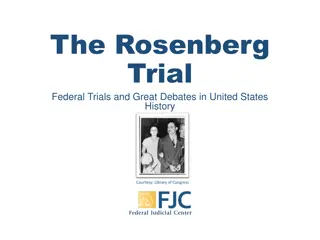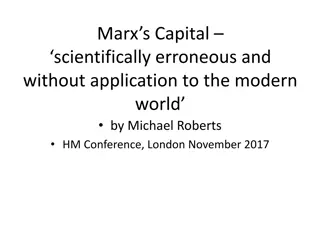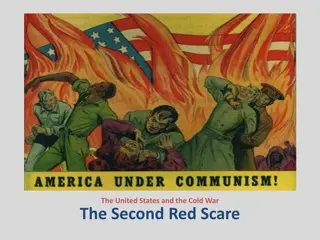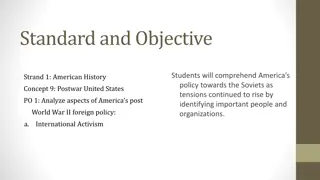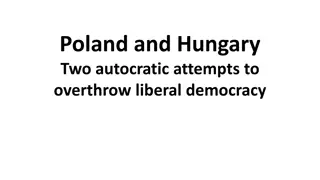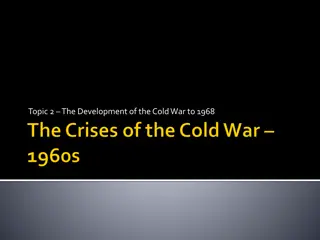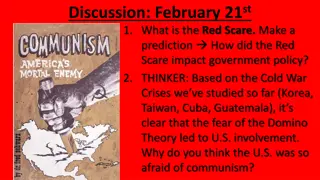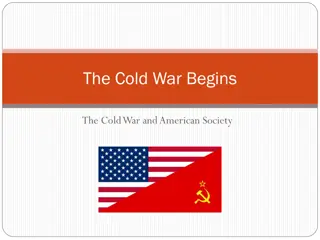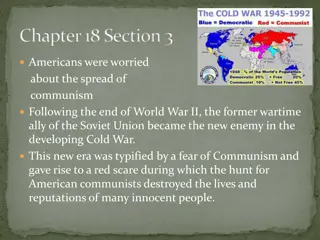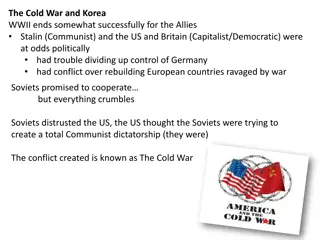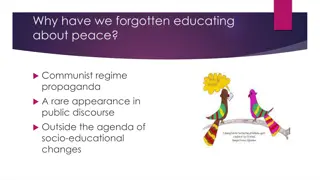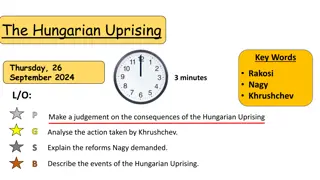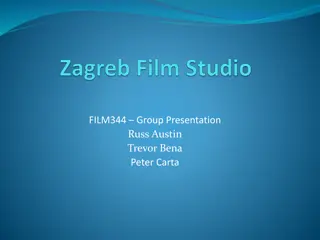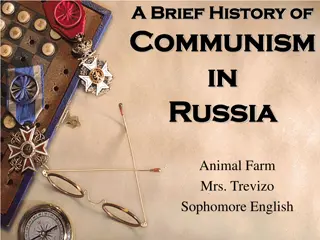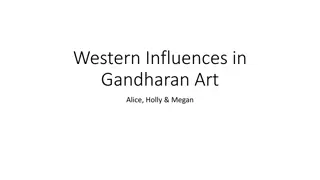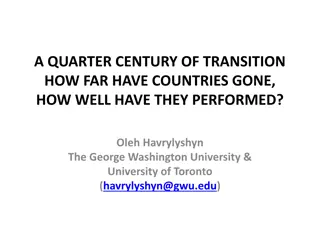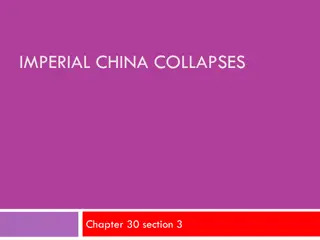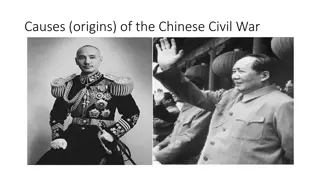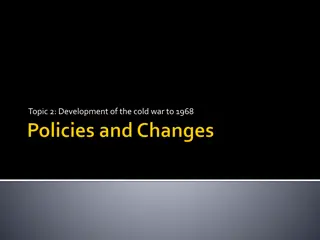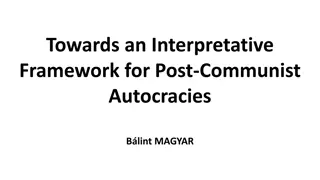Law and Religion in Ethiopia: A Historical Overview
Explore the evolution of the complex interaction between law and religion in Ethiopia, from Imperial Ethiopia to the Communist Era and the post-communist period. Discover the rich historical origins of Ethiopia, including its diverse religious landscape and unique governance structures. Delve into t
0 views • 28 slides
Insight into North Korea: Government, Rights, and the People
Learn about the communist regime in North Korea led by Kim Jong-un, the limited rights of its citizens, the government's control over businesses and resources, and the challenges faced by the people in this closed-off nation.
0 views • 17 slides
Retrieval Practice in Animal Farm: Lessons on Communism, Allegories, and Propaganda
In this detailed study guide, explore key themes from George Orwell's "Animal Farm", focusing on topics like the Communist Manifesto, bourgeoisie representation, capitalism vs. communism, rhetorical strategies, Karl Marx, fables, anthropomorphism, allegories, Russian Revolution parallels, and the us
1 views • 20 slides
Understanding Taoism: Ancient Chinese Philosophy and Beliefs
Taoism, an ancient tradition deeply rooted in Chinese customs, focuses on the concept of the Tao, the ultimate creative principle of the universe. It emphasizes harmony with nature, spiritual immortality, and self-development through practices like meditation and feng shui, while also incorporating
0 views • 48 slides
Political Instability of the Weimar Republic: Spartacist and Kapp Putsches
The Weimar Republic faced political instability due to uprisings like the Spartacist and Kapp Putsches, rooted in dissatisfaction with its surrender to the Allies, weak constitution, and failure to address food shortages. The Spartacist Rising of January 1919, led by figures like Karl Liebknecht and
3 views • 18 slides
Karl Marx: The Revolutionary Thinker and Philosopher
Explore the life and theories of Karl Marx, a prominent figure in political philosophy and economics. Discover his works such as "Capital" and "The Communist Manifesto," as well as his theory of history and dialectical materialism. Learn about the impact of technology and power on the mode of produc
0 views • 42 slides
Understanding Economic Systems and Their Impacts on Societies
Explore how different societies meet their economic needs through traditional, free enterprise, and communist economic systems. Learn about the advantages and disadvantages of each system, from the customs-based decisions in traditional economies to the government-controlled operations in communist
2 views • 17 slides
Two Revolutions in Russia: The March and November Revolutions of 1917
The year 1917 witnessed two significant revolutions in Russia - the March Revolution leading to the abdication of the Tsar and the formation of the Provisional Government, followed by the November Revolution where Lenin's Bolsheviks overthrew the Provisional Government and established the world's fi
0 views • 20 slides
Vygotsky's Marxism in the 21st Century: A Critical Analysis by Anton Yasnitsky, Ph.D.
Anton Yasnitsky, Ph.D., a member of the Young Communist League of the USSR, presents a critical analysis of Vygotsky's Marxism in the 21st century. The three-volume research project explores Vygotsky's legacy and impact on psychology, challenging existing interpretations and offering new insights. T
0 views • 37 slides
Insights into Animal Farm: A Narrative of Betrayal and Manipulation
The narrative of Animal Farm encapsulates the evolution from an idealistic society to a manipulative regime, illustrating themes of betrayal, rule violations, manipulation, leadership exaggeration, harsh penalties, rumor spreading, forced labor, and emotional suppression within a communist-socialist
0 views • 10 slides
Exploring National Identity and Revolutionary Ideals in European History
In this discussion, we delve into Karl Marx's beliefs in the Communist Manifesto, the lack of Communist revolutions in the 19th century, the role of national identity in societies, and the concept of imagined communities as outlined by Benedict Anderson. Through analyzing historical events and schol
2 views • 10 slides
Memorials of the Korean War
Explore various memorials dedicated to the Korean War, including the Korean Veterans Memorial in the UK, the Chinese Communist Memorial, the Statue of Brothers in Seoul, and the US Korean War Veterans Memorial in Washington DC. Each memorial tells a unique story about the conflict and the involvemen
0 views • 6 slides
The Cold War Expansion and Nuclear Arms Race
The Cold War intensified as the Soviet Union detonated an atomic bomb, leading to heightened tensions. Communist advancements, including the takeover of communist China, shocked the world. Nuclear arsenals expanded with the development of the hydrogen bomb, sparking concerns of an arms race. Eisenho
0 views • 17 slides
Key Influences on Human Resource Management Stakeholders and Responsibilities
Key influences on human resource management encompass stakeholders, legal framework, economic, social, technological, ethics, and corporate responsibility. Stakeholders involve various groups with interests such as employers, employees, unions, government, and shareholders. Employers seek flexibilit
0 views • 57 slides
The Rosenberg Trial and the Red Scare: Cold War Espionage and Anti-Communist Hysteria
The Rosenberg Trial during the Cold War era exemplified the heightened tensions of the time, showcasing accusations of espionage, Communist subversion, and anti-American sentiment. Julius and Ethel Rosenberg faced allegations of passing atomic secrets to the Soviet Union, amid a backdrop of fear and
0 views • 14 slides
The Rise of Communism in Russia: Key Figures and Events
Russia's transition to communism was marked by social and political upheaval, with figures like Karl Marx, Lenin, Trotsky, and Stalin playing pivotal roles. The Russian Revolution, civil war, and the rise of the Soviet Union reflected a shift towards communist ideology, leading to significant change
0 views • 37 slides
The Rise and Rule of Leaders in Russia: Marx, Lenin, and Stalin
The journey of political upheaval in Russia, from the writing of the Communist Manifesto by Marx and Engels to the rule of Lenin and the dictatorship of Stalin, marked by revolution, famines, purges, and the Great Terror.
0 views • 13 slides
Marx Versus Keynes: A Critical Examination of Economic Theories
Michael Roberts critiques Marx's Capital as scientifically erroneous and irrelevant to the modern world, contrasting it with Keynesian economics which questions the applicability of communist doctrine in contemporary society. The debate revolves around value theory, production, economic crises, and
0 views • 41 slides
The United States and the Cold War: Historical Overview
The content explores the dynamics of the Cold War, focusing on China's internal conflict, the Korean Peninsula division, and the impact of the Second Red Scare in the United States. It delves into the feuds between different factions in China, the rise of communism, the Korean War phases, and the do
0 views • 15 slides
America's Policy Towards Soviets in the Early Cold War Years
The early Cold War period saw heightened tensions between America and the Soviets, with key events like the Long Telegram and Crisis in Iran shaping America's containment policy. Diplomat George Kennan's Long Telegram highlighted Soviet insecurity, leading to the policy of containment. Crisis in Ira
0 views • 13 slides
Social Entrepreneurship in the Czech Republic: Roots, Development, and Current Status
Roots of social entrepreneurship in the Czech Republic trace back to solidarity values pre-transition to a market economy. Suppressed under communist regimes, resurgence post-transition faced challenges due to lack of institutional framework. Presently, the Czech Republic lacks specific legislation
0 views • 13 slides
Comparing Autocratic Attempts in Poland and Hungary
Poland and Hungary exhibit common ideological frames in their autocratic attempts, focusing on regime change rather than government shifts. These attempts utilize ethnonationalism, Euro-skepticism, and xenophobia to justify their actions. The two countries also showcase different types of post-commu
0 views • 15 slides
The Cold War: Key Events up to 1968
West Berlin thrived while East Berlin suffered as the city became divided by a wall in 1961. The Vietnam War saw North and South Vietnam backed by different superpowers, leading to conflict until 1975. Cuba turned communist under Fidel Castro in 1959, prompting tensions with the US, notably during t
0 views • 9 slides
The Red Scare and McCarthyism: Cold War Repression in America
The Red Scare and McCarthyism were periods of intense anti-communist hysteria in the United States during the Cold War. The fear of communism led to government policies that restricted dissent, fueled by figures like Senator Joseph McCarthy who made unfair allegations and targeted various groups. Th
0 views • 13 slides
The Impact of the Red Scare and McCarthyism on American Society
The Cold War era saw the rise of the Red Scare and McCarthyism in America, fueled by fears of Communist infiltration. The loyalty review program, House Un-American Activities Committee, and infamous cases like Alger Hiss and the Rosenbergs reflect the intensity of the anti-Communist hysteria. Joseph
0 views • 12 slides
The Red Scare and Anti-Communist Hysteria in Post-World War II America
Americans in the post-World War II era were gripped by fears of communism, leading to the Red Scare and intense anti-communist sentiment. This period saw the rise of initiatives like the Loyalty Review Board and the House Committee on Un-American Activities, which targeted suspected communists in va
0 views • 16 slides
The Cold War and Its Impact: Truman Doctrine, Marshall Plan, and Iron Curtain
The Cold War emerged from the tensions between the Communist Soviet Union and the Capitalist Democratic US and its allies after WWII. The conflict led to the Western Bloc led by the US and the Eastern Bloc led by the Soviets. The US implemented the Truman Doctrine and Policy of Containment to preven
0 views • 14 slides
Education for Peace: A Call to Prioritize Socio-Educational Changes
Communist regime propaganda has sidelined the importance of educating about peace in public discourse. The concept of peace encompasses the absence of war, violence, and the promotion of tolerance. Defining education for peace entails shaping attitudes towards living harmoniously with oneself, other
0 views • 12 slides
The Hungarian Uprising of 1956: Consequences and Reforms
The Hungarian Uprising of 1956 was a pivotal event in Hungary's history, marked by protests against Soviet oppression and the leadership of Matyas Rakosi. Khrushchev's decision to replace Rakosi with Imre Nagy reflected a shift in Communist leadership. The demands for free speech and withdrawal of S
0 views • 15 slides
History of Animation in Croatian Film Industry
Croatian-based film company Zagreb Studios has a rich history of animation since its inception in 1953. The studio's animation legacy traces back to the late 1940s when the first independent animated film in Croatia was produced. Despite facing challenges like government funding cuts, isolation from
0 views • 11 slides
Understanding National Governments in Southern and Eastern Asia
Explore the different types of government systems in Southern and Eastern Asia, such as the federal republic of India, the communist state of the People's Republic of China, and the constitutional monarchy of Japan. Learn about the leadership structures, citizen roles, and voting rights in each coun
0 views • 20 slides
The Artistic Journey of Thomas Wilkowski & Richard Taggart
Thomas Wilkowski and Richard Taggart were renowned artists known for their contributions to puppet animation and illustration. Born in 1912 in Bohemia, Wilkowski began sculpting puppets and later illustrated numerous children's books, earning recognition such as the Hans Christian Andersen Award. De
0 views • 10 slides
A Brief History of Communism: From Capitalism to Karl Marx's Vision
The history of communism traces back to the capitalist system's exploitation of workers in the mid-1800s. Karl Marx's vision, outlined in "The Manifesto of the Communist Party," aimed for economic equality and worldwide revolution. The inherent flaws of capitalism were critiqued, leading to the rise
0 views • 17 slides
Western Influences in Gandharan Art: Greco-Roman Impact and Cultural Blend
Western influences played a significant role in shaping Gandharan art between the 1st century BCE and 7th century CE. The art flourished during the Kushan Dynasty under various influences, notably Greco-Roman. The integration of Western elements transformed the artistic style in Gandhara, creating u
0 views • 8 slides
Economic Transition in Post-Communist Countries: A Quarter Century Review
This presentation by Oleh Havrylyshyn explores the progress and performance of post-communist economies since the fall of the Berlin Wall in 1989. It compares different countries' approaches to marketization, privatization, economic performance, and political transformation. The analysis highlights
1 views • 28 slides
Evolution of Political Protests in Modern Russia: A Historical Overview
This article provides an in-depth analysis of the evolution of political protests in modern Russia from 1990 to present. It discusses the attitude of Russian journalists towards protests, basic concepts of political protest in modern political science, myths surrounding protests in Russia, and the f
0 views • 24 slides
The Collapse of Imperial China and the Rise of Nationalism
In early 20th-century China, resentment towards foreign control led to the overthrow of the Qing Dynasty by the Nationalists, with leaders like Sun Yixian and the Kuomintang Party. Despite efforts for political and economic rights, internal conflicts and external influences such as World War I impac
0 views • 17 slides
Causes and Origins of the Chinese Civil War
The Chinese Civil War was sparked by a variety of factors including a power vacuum, weak government, competing interests, ideological differences, and foreign intervention. Demographically, China is primarily inhabited by the Han Chinese with over 500 national minorities. The Qing (Manchu) dynasty's
0 views • 17 slides
Cold War Development to 1968
The Cold War escalated from the US providing support to countries threatened by communist expansion to the Soviet Union's policy of peaceful co-existence in the 1950s under new leadership like Nikita Khrushchev. Tensions rose with issues like Berlin becoming a free city proposal. The period also saw
0 views • 8 slides
Framework for Understanding Post-Communist Autocracies
The illusion of linear progress towards liberal democracies post-1989-1990 revolutions is challenged by the complex reality of post-communist autocracies. This framework explores the characteristics of democracy, autocracy, and dictatorship to categorize regimes, highlighting the challenges and nuan
0 views • 41 slides
